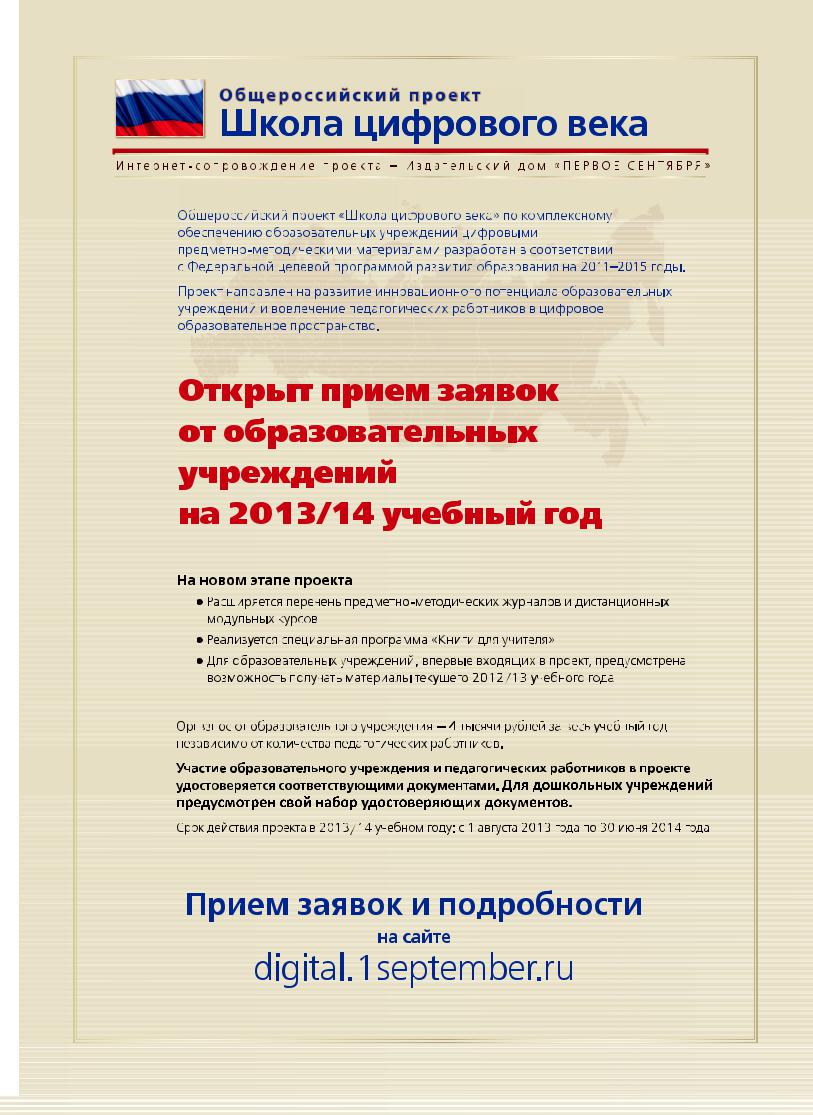
- •NEWS IN BRIEF
- •TEXTS FOR READING
- •Juvenile Delinquency
- •Numbats and Wandoo Trees
- •METHODS OF TEACHING
- •CLASSROOM ACTIVITIES
- •Good Friends Help You Live Longer
- •CREATIVE WRITING
- •Friendship
- •FOCUS ON LANGUAGE
- •Strange Friends
- •TEACHERS FORUM
- •LESSON PLANS
- •TOPICAL JOURNEY
- •Friendship Day
- •Importance of Friendship in Bible
- •Friendship Stories
- •Symbols of Friendship
- •Friendship Literature
- •Shakespeare Quotations on Friendship
- •Letter Writing
- •Idioms about friendship
- •Email Etiquette
- •FOCUS ON LITERATURE
- •SCHOOL THEATRE
- •Six Friends
- •Five-Minute Tests
- •YOUTH ENGLISH SECTION
- •Compliments
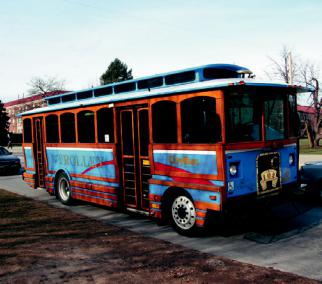
English |
|
YOUTH ENGLISH SECTION |
|
56 |
|
continued from No. 1 |
|
February 2013 |
BETWEEN THE CONTINENTS: |
||
American Reality with Russian Eyes
American Roller-Coasters on Russian Roads
Sometimes in the U.S. I had a feeling I missed something. I had everything at my disposal to enjoy life and still I missed… our crazy Russian reality.
Once in my journalism class in the U.S. we discussed good and bad news. Why is there more bad news than good in the media? Is good news no news at all? One of the students said that Americans are generally attracted to drama. In my mind, interest in dramatic events lies deep in human nature, and that can’t explain the public longing for bad news in the United States. The reason for the interest is that American life lacks excitement and risk.
American people do not get their daily portion of stress. In Russia, you will become stressed just taking a bus. You do not need to go to an amusement park; a common bus ride is enough. First, you must squeeze into a small space because you are in a hurry, and the bus schedule is not reliable at all. Second, you must watch your purse or it may be stolen. Next, try not to touch a representative of the older generation. You do not need his or her irritation to focus on you. And finally, you are to get off at the right stop. It is not as simple as “stop requested” like on American buses. You fight your way through the crowd. Be careful to do it in advance, but not too early, or you will be carried out before you know where you are. Is that enough stress for a day?
American everyday life is calmer compared to Russian life, at least on the road. In the United States, there is no excessive speeding or breaking the rules compared to Russia. The famous saying “time is money” does not apply to driving. An American driver will slow down at a stop sign, even if there is nobody in front of him or her and it is late at night. This was so amazing for a Russian that I couldn’t get used to a car waiting for me, a pedestrian, to pass before crossing the street. Every time it stopped, I repeated to myself, “Welcome
to the U.S.” Fortunately, I didn’t develop such a habit or I would be run over as soon as I returned to Russia.
Russian roads have become notorious, not only because they always seem to be in need of repair, but also because of crazy driving. No car will wait for me to pass. Instead I have to wait for a stream of cars even though traffic lights tell me to go. Again, save money on amusement parks – just try to cross the road.
I do not want to say that Russia is full of naughty old men and mad drivers. I exaggerated these points to show that Americans are losing their spirit of adventure, which they had as a nation of pioneers. Conventions and means to make life convenient rub it out.
Let’s take canoeing, for example. I went canoeing with the International Students’Association in Michigan and I really enjoyed it, though not enough to satisfy the “mysterious Russian soul.” Canoeing in America is a calm river trip for two hours or more. You park your car, rent a canoe, watch tamed ducks and swans, smell the barbeque made on artificial coal, greet passing paddleboats and kayaks and enjoy your meal afterward.
Canoeing in Russia was a tough experience for me, an adventure I will remember for the rest of my life. You are a real pioneer and an explorer of the wild nature, lost villages and old houses where grandfathers’ traditions are still preserved. It can require intense strain to go through it when you are wet all over and there is no Wal-Mart to buy a dry pair of pants. There is only a swirling river, a dangerous river, an exciting river, a divine river. Canoeing in Russia is a challenge. You take the challenge and want to succeed because all the team depends on you. The water wants to swallow you, but you are the strongest, the one to survive. If you are able to compete with the elements there on the river, you will achieve any goal in the everyday life. Canoeing in Russia is a life lesson, a spirit workshop.
That’s why Russians take everyday risk and stress so easy. You can always dry your wet clothes in the caressing sun after the roaring water. You can smile to encourage a close friend after a stressful bus trip. “The sweet is not as sweet without the sour,” as Cameron Crowe’s character in “Vanilla Sky” said.
American life sometimes lacks the sour. That’s why the sweet is so standard and blurred at times.
International Friend
in Need Is in Need Indeed
Friends in the U.S. are a bit different. But international students have their own perception of friendship and can tell a real friend from a mere acquaintance.
Striking as it is, a person from another continent can be closer to you than your neighbour. When two people from different countries meet on common land, they have at least one thing in common: the distance that separates them from their roots. They may have different values, represent differ-
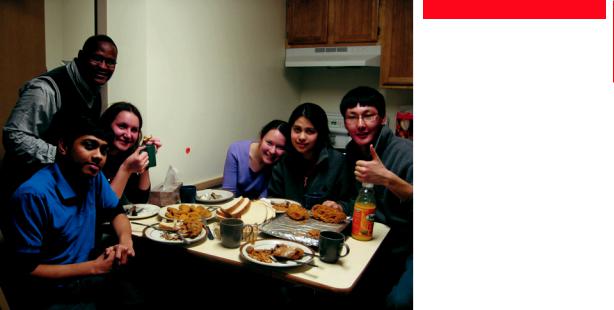
ent cultures or speak different languages, but they are in the same boat. They are miles away from their homeland and they have to make friends.
Making friends in America is not the same as in Russia. The expression “to make friends” in America means to shake hands with an unknown person that someone introduces you to. It means to have a nice talk during lunch and say, “See you,” even though you may never see this person again. Americans make friends in line for an ice cream or at a party where they don’t know half of their guests. To make friends is part of American culture and, indeed, a rather positive part. I like to meet new people. I think of it as adding a new drop to my knowledge of the world. On the other hand, once you make a stop in the swirling rhythm of life you realize that you do not remember half of the names or that you cannot dial a single number when you need it, even though you have a bunch of your friends’ business cards sitting on your desk. In Russia, what Americans call friends, we call “acquaintances.”
Friendship in my country is not only a conventional exchange of phrases, “How are you?” and “How is it going?” or the more typical for teenagers, “What’s up, man?” because Russians rely on people they call friends. When your friend asks how you are, he doesn’t expect you to say a stale “OK,” but he is interested in details and wants to listen to you. You can spill your guts to your friend, complain about the person who is a pain in your neck, ask for advice, share your problems and successes, as well as deep sorrow or even boundless happiness. You do it because you trust your friend. This is what I mean by saying people make friends miles away from home on neutral turf. They create a meaningful relationship.
International students especially need someone to rely upon in a new country. They are extracted from their familiar environments and are immersed into a strange culture.
One day I asked a student from Germany, “How are you?” His answer was, “Trying to survive.” This phrase perfectly describes the situation in which newcomers find themselves in America.
Many international students feel helpless in the U.S. They don’t even have the transportation to go out and explore their new world. You need a car to go out or to buy some toiletries, even in such a small town where I lived. It forces you to be
YOUTH ENGLISH SECTION English
57
February 2013
dependent on other people in a country where freedom and independence are supreme values.
No wonder a car is the primary objective for most young Americans. In my public speaking class, we had to deliver a “million dollar speech,” where we described the first three things we would spent a million dollars on. Listening to my American classmates, I felt like I was at a car dealership. Nobody forgot to explain the advantages of their dream car. It seems Americans grow up with the idea of a car as an absolute ideal. Car is idol. Car is God.
However, the absence of a car is just a hint of the difficulty international students cope with. Homesickness is also a major problem. It’s not when you are sick and tired of domestic chores – that’s easy. Homesickness means you are sick because you miss home so much and not only home but everything connected with it (even if it’s a cup of tea with jam in a country where coffee is more common). I don’t think we can count this feeling in miles, but it makes a difference whether your family is several miles away or across an ocean. My friend told me she once burst into tears in the middle of the class. She wasn’t thinking about her grades, she was thinking about her fiancé on the other side of the world.
At such a time nobody wants to hear an acquaintance ask, “How are you?” But a friend’s shoulder to cry on is essential because an international friend in need is in need indeed - more so than an American freshman who can drive home every weekend.
Here is another example. An international student from Kyrgyzstan came down with chickenpox at the beginning of the semester. It was Labour Day, an American national holiday, so University Health Center was closed. He had a high fever, no telephone and no roommate nearby. So he went to the president of the International Students’ Association. This student woke up in two minutes, without having breakfast and took the sick student to the emergency room with another international student acting as an interpreter. They both stayed in the hospital until evening. That’s what real friends do.
Only a friend can sacrifice his time whether it is to take you to the hospital or to help you buy a bathing suit or choose a laptop on the internet. Only a friend can send you homemade cookies to help you forget your loneliness or take you to see her mother’s dogs to lighten your heart. Only a friend can talk with you for an hour about his country if you need it for your class. Miles away from home I make real friends who helped me to cope with disappointing trifles and enormous homesickness. They helped me to survive in a foreign country because an international friend in need is a friend indeed.
By Anastasia Maslova Photos by the author to be continued

English |
|
|
YOUTH ENGLISH SECTION |
|
58 |
|
COMPLIMENTS |
||
February 2013 |
|
|||
|
||||
GIVING A COMPLIMENT
Here are some useful ways to give a compliment
•Your hair looks fantastic!
•I really like your dress.
•That’s a really nice picture.
•Your new car is great.
•I think your new haircut really suits you.
•That new skirt looks great on you!
•That’s a great looking car.
•What a lovely baby!
•Isn’t your ring beautiful?
•You did a really good job!
•You handled that situation really well.
•This food is delicious!
•I’d just like to compliment you on your recent achievement.
•That report you wrote was fantastic.
RESPONDING A COMPLIMENT
And here are some useful ways to respond to a compliment. In each mini-dialogue, person A is giving a compliment and person B is responding.
•Thanking someone
A:That’s a really nice sweater.
B:Thanks. / That’s nice of you to say so.
•Giving details
A:Nice rug.
B:Thanks. I got it in a street market in Morocco.
•Downgrading a compliment
A:That painting is really nice.
B:Oh, it’s nothing. It was really cheap. I got it in a sale.
•Agreeing
A:I love that sofa you bought.
B:Yes, me too.
•Disagreeing
A:You dealt with that really well.
B:Oh, I don’t think so.
•Responding with a question
A:You did an excellent job yesterday.
B:Do you really think so?
•Shifting the credit
A:That clock looks great in your living room.
B:Thanks, but it was Keira who chose it.
•Returning the compliment
A:You look great.
B:So do you.
•Sharing the credit
A:You did a fantastic job.
B:Thanks, but I could not have done it without the others.
•Building up the achievement
A:That was amazing! Well done!
B:It’s actually a lot harder than it looks.
•Complimenting the complimenter
A:Thanks. I’m glad you enjoyed it.
B:Thank you. It’s really nice to hear that from someone with your experience.
•Ironic humour
A:Well done for stopping that robber.
B:I was actually trying to run away. I had no intention of trying to stop him.
•Suspicion
A:That suit looks so good on you.
B:What are you after?
DIALOGUE
Old friends Dina and Maria are having lunch. It’s the first time they’ve seen each other in ten years.
Dina: Maria! It’s great to see you again. You look fantastic!
Maria: Thanks, you look great, too. I love your hair. Dina: You’re joking! I haven’t been to hairdresser for
ages.
Maria: I hear that you have been very busy lately. You were nominated for a Business person of the Year award, haven’t you? You must be so proud.
Dina: Well, you know, I have got a great team behind me, so I really have them to thank. Hey, I read your latest novel. It’s really funny!
Maria: Do you think so? The reviews haven’t been so great. Dina: Well, I loved it!
Maria: That very kind of you. It was a lot of hard work. By the way, I saw your wedding photos on Facebook. What a beautifull dress!
Dina: Ok, that old thing. It’s been in the family for generations.
Maria: And your husband looks like a real catch. Dina: Yeah, John is a great guy.
Maria: He is so handsome.
Dina (laughing nervously): Yes, he is. Oh, I have been meaning to ask, what’s all this about a bank robbery? You helped catch one of the robbers, didn’t you?
Maria: Oh, It was nothing. I was just in the right place at the right time. I was actually trying to run away. But I must have tripped and knocked the gun out of the robber’s hands.
Dina: Incredible. Anyway, I must be going. We have to do this again soon.
Maria: Definitely! And bring John next time. I cant wait to meet him. He is so hansome.
Dina: Erm, yes, great.
By Elena Kinakh,
Russian State University for the Humanities
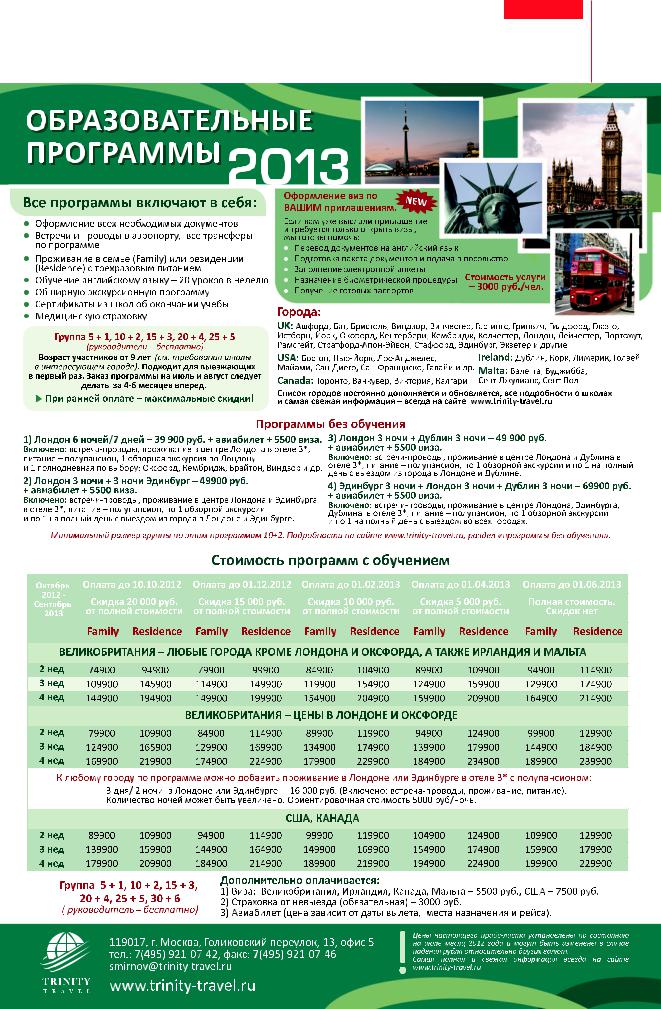
РЕКЛАМА English
59
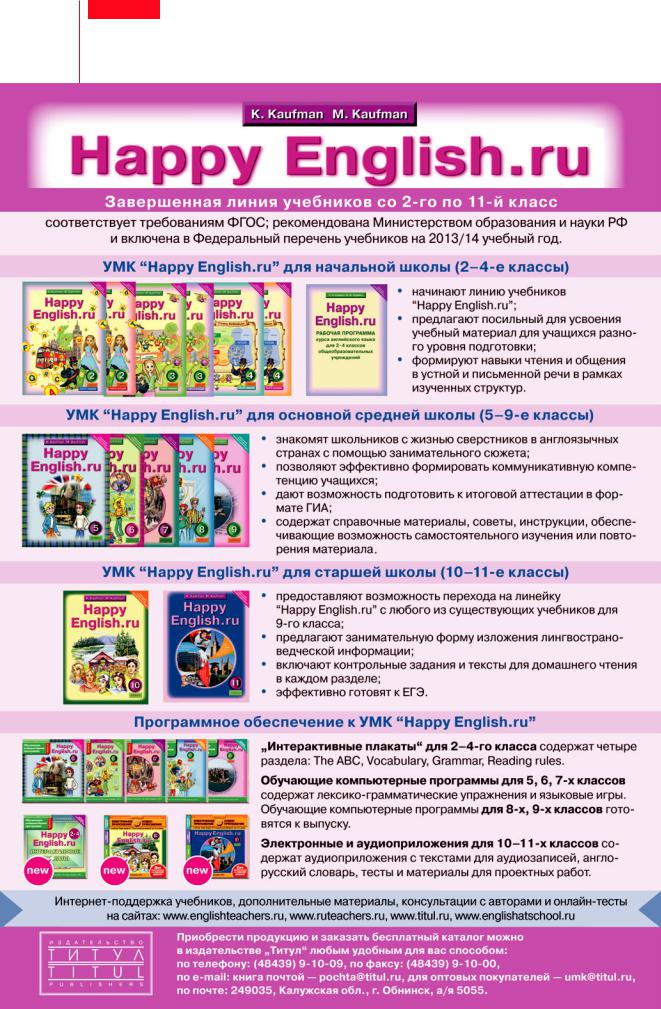
English РЕКЛАМА
60
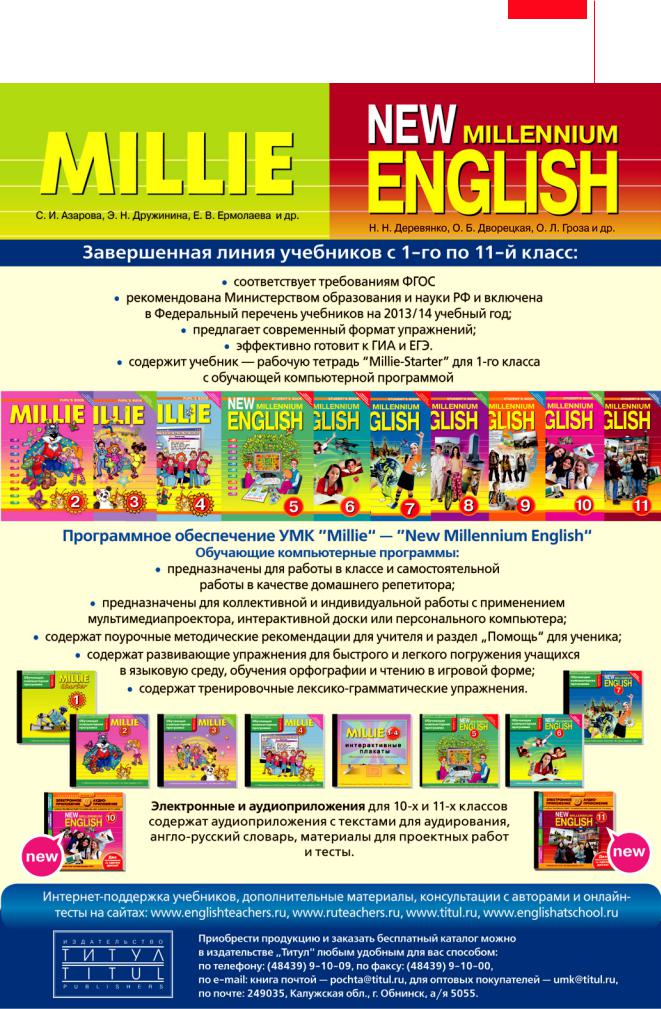
РЕКЛАМА English
61
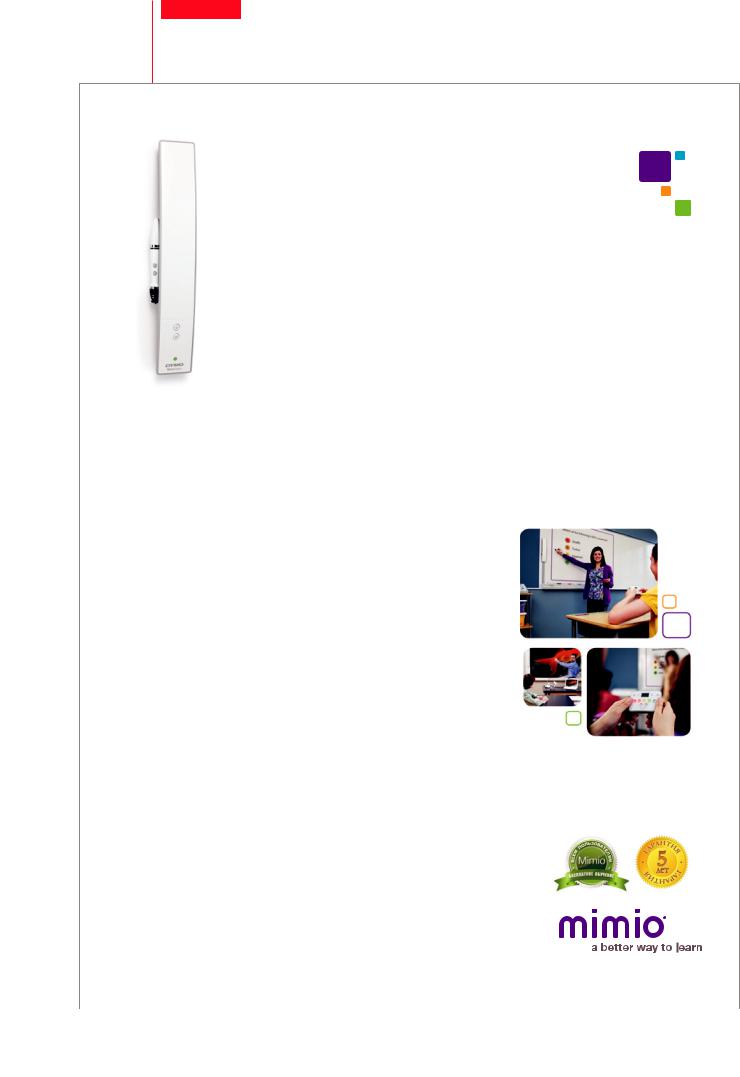
English РЕКЛАМА
62
Интерактивная приставка
MimioTeach
превращает вашу классную доску в интерактивную.
Все, что вам нужно от интерактивной доски, но проще, удобнее и быстрее.
И за меньшие деньги.
Компактное и недорогое решение, позволяющее использовать в качестве интерактивной доски обычные маркерные и меловые доски.
MimioTeach™ была создана учителями и для учителей, поэтому обучиться работать с этой приставкой очень просто. Легкость установки и полнофункциональное программное обеспечение позволяют начать активно использовать MimioTeach на уроке практически сразу же после покупки.
Традиционные интерактивные доски громоздки и дороги, каждую доску можно использовать только в одном классе. Приставка MimioTeach компактна, ее легко переносить
из класса в класс, а по окончании урока можно забрать с собой и хранить в учительской.
MimioTeach обходится значительно дешевле интерактивной доски. При этом технологически приставка полностью соответствует возможностям обычных интерактивных досок, а часто и превосходит их.
Обратите внимание: MimioTeach является частью комплексного интерактивного решения MimioClassroom, включающего в себя также документ-камеру, систему тестирования и другое интерактивное оборудование.
Мы предлагаем нашим пользователям широкие возможности бесплатного обучения: семинары, курсы повышения квалификации и дистанционные обучающие курсы всегда к услугам учителей, использующих оборудование Mimio.
Продажа оборудования, консультации и обучение:
http://www.mimioclass.ru
8 (800) 5555-33-0
Звонок по России бесплатный
ООО «Рене» — генеральный дистрибьютор Mimio в России

М
М
М О С К О В С К И Й П Е Д А Г О Г И Ч Е С К И Й
МАРАФОН
УЧЕБНЫХ ПРЕДМЕТОВ
Д Е П А Р Т А М Е Н Т О Б Р А З О В А Н И Я г . М О С К В Ы И З Д А Т Е Л Ь С К И Й Д О М « П Е Р В О Е С Е Н Т Я Б Р Я » М О С К О В С К И Й И Н С Т И Т У Т О Т К Р Ы Т О Г О О Б Р А З О В А Н И Я
2013 25 МАРТА – 19 АПРЕЛЯ
РАСПИСАНИЕ ДНЕЙ ПЕДАГОГИЧЕСКОГО МАРАФОНА
25 ȔȈȘȚȈ ǬȍȕȤ țȟȐȚȍȓȧ ȚȍȝȕȖȓȖȋȐȐ*
26 ȔȈȘȚȈ ǶȚȒȘȣȚȐȍ ǴȈȘȈȜȖȕȈ
ǬȍȕȤ ȒȓȈșșȕȖȋȖ ȘțȒȖȊȖȌȐȚȍȓȧ 27 ȔȈȘȚȈ ǬȍȕȤ ȠȒȖȓȤȕȖȋȖ ȗșȐȝȖȓȖȋȈ
ǬȍȕȤ țȟȐȚȍȓȧ ǶǩǮ
28 ȔȈȘȚȈ ǬȍȕȤ ȏȌȖȘȖȊȤȧ ȌȍȚȍȑ, ȒȖȘȘȍȒȞȐȖȕȕȖȑ ȗȍȌȈȋȖȋȐȒȐ, ȓȖȋȖȗȍȌȈ, ȐȕȒȓȦȏȐȊȕȖȋȖ ȖȉȘȈȏȖȊȈȕȐȧ Ȑ ȓȍȟȍȉȕȖȑ ȜȐȏȐȟȍșȒȖȑ ȒțȓȤȚțȘȣ
29 ȔȈȘȚȈ ǬȍȕȤ țȟȐȚȍȓȧ ȕȈȟȈȓȤȕȖȑ ȠȒȖȓȣ
(ȌȍȕȤ ȗȍȘȊȣȑ)
30 ȔȈȘȚȈ ǬȍȕȤ țȟȐȚȍȓȧ ȕȈȟȈȓȤȕȖȑ ȠȒȖȓȣ
(ȌȍȕȤ ȊȚȖȘȖȑ)
31 ȔȈȘȚȈ ǬȍȕȤ ȌȖȠȒȖȓȤȕȖȋȖ ȖȉȘȈȏȖȊȈȕȐȧ
2 ȈȗȘȍȓȧ ǬȍȕȤ țȟȐȚȍȓȧ ȋȍȖȋȘȈȜȐȐ
3 ȈȗȘȍȓȧ ǬȍȕȤ țȟȐȚȍȓȧ ȝȐȔȐȐ
4 ȈȗȘȍȓȧ ǬȍȕȤ țȟȐȚȍȓȧ ȉȐȖȓȖȋȐȐ
5 ȈȗȘȍȓȧ |
ǬȍȕȤ țȟȐȚȍȓȧ ȐȕȜȖȘȔȈȚȐȒȐ |
6 ȈȗȘȍȓȧ |
ǬȍȕȤ țȟȐȚȍȓȧ ȜȐȏȐȒȐ |
7 ȈȗȘȍȓȧ |
ǬȍȕȤ țȟȐȚȍȓȧ ȔȈȚȍȔȈȚȐȒȐ |
9 ȈȗȘȍȓȧ |
ǬȍȕȤ țȟȐȚȍȓȧ ȐșȚȖȘȐȐ Ȑ ȖȉȡȍșȚȊȖȏȕȈȕȐȧ |
10 ȈȗȘȍȓȧ |
ǬȍȕȤ țȟȐȚȍȓȧ ǴǽDz, ȔțȏȣȒȐ Ȑ ǰǯǶ |
11 ȈȗȘȍȓȧ |
ǬȍȕȤ ȠȒȖȓȤȕȖȋȖ |
|
Ȑ ȌȍȚșȒȖȋȖ ȉȐȉȓȐȖȚȍȒȈȘȧ |
12 ȈȗȘȍȓȧ |
ǬȍȕȤ țȟȐȚȍȓȧ ȓȐȚȍȘȈȚțȘȣ |
13 ȈȗȘȍȓȧ |
ǬȍȕȤ țȟȐȚȍȓȧ ȘțșșȒȖȋȖ ȧȏȣȒȈ |
14 ȈȗȘȍȓȧ |
ǬȍȕȤ țȟȐȚȍȓȧ ȈȕȋȓȐȑșȒȖȋȖ ȧȏȣȒȈ |
16 ȈȗȘȍȓȧ |
ǬȍȕȤ țȟȐȚȍȓȧ ȜȘȈȕȞțȏșȒȖȋȖ ȧȏȣȒȈ |
17 ȈȗȘȍȓȧ |
ǬȍȕȤ țȟȐȚȍȓȧ ȕȍȔȍȞȒȖȋȖ ȧȏȣȒȈ |
18 ȈȗȘȍȓȧ |
ǬȍȕȤ țȟȐȚȍȓȧ ȜȐȏȐȟȍșȒȖȑ ȒțȓȤȚțȘȣ |
19 ȈȗȘȍȓȧ |
ǬȍȕȤ ȠȒȖȓȤȕȖȑ ȈȌȔȐȕȐșȚȘȈȞȐȐ |
|
ǯȈȒȘȣȚȐȍ |
marathon.1september.ru
Обязательная предварительная регистрация на все дни Марафона откроется 20 февраля 2013 года на сайте marathon.1september.ru.
Каждый участник Марафона, посетивший три мероприятия одного дня, получает официальный именной сертификат (6 часов)
В дни Марафона ведущие издательства страны представляют книги для учителей
Начало работы – 9.00. Завершение работы – 15.00
УЧАСТИЕ БЕСПЛАТНОЕ. ВХОД ПО БИЛЕТАМ
ǸǭǫǰǹǺǸǰǸǻDZǺǭǹȄ, ǸǨǹǷǭǿǨǺȃǪǨDZǺǭ ǹǪǶDZ ǩǰdzǭǺ ǰ ǷǸǰǽǶǬǰǺǭ!
ǴȍșȚȖ ȗȘȖȊȍȌȍȕȐȧ ǴȈȘȈȜȖȕȈ: ȓȐȞȍȑ ȹ 1535, țȓ. ǻșȈȟȍȊȈ, ȌȖȔ 50 (Ȋ 3 ȔȐȕțȚȈȝ ȝȖȌȤȉȣ ȖȚ șȚȈȕȞȐȐ ȔȍȚȘȖ «ǹȗȖȘȚȐȊȕȈȧ») * ǴȍșȚȖ ȗȘȖȊȍȌȍȕȐȧ Ǭȕȧ țȟȐȚȍȓȧ ȚȍȝȕȖȓȖȋȐȐ: ǾǶ ȹ 293, țȓ. ȇȘȖșȓȈȊșȒȈȧ, Ȍ. 27 (șȚ. ȔȍȚȘȖ «ǪǬǵǽ»)
ǷȖ ȊșȍȔ ȊȖȗȘȖșȈȔ ȖȉȘȈȡȈȑȚȍșȤ, ȗȖȎȈȓțȑșȚȈ, ȗȖ ȚȍȓȍȜȖȕț: 8-499-249-3138 ȐȓȐ ȗȖ ȥȓȍȒȚȘȖȕȕȖȑ ȗȖȟȚȍ: marathon@1september.ru
